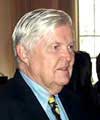
|
|
Robert Mundell
|
The 1999-2000 academic year saw the addition of several new jewels to the crown of Columbia University: a Nobel Prize in Economics for Prof. Robert Mundell; the opening of the new student center, Lerner Hall; a Rhodes Scholarship for College senior Brandon Dammerman, and an Ivy League championship for the men's tennis team, to name just a few.
Columbia continued to set records in admissions this year. The number of applications increased while admit rates droppedčagain making Columbia among the nation's most selective schools.
Despite the looming, empty threat of Y2K pandemonium, the dawning of the new millennium at Columbia was as bright as one could wish.
In October 1999, just a few weeks into the school year, the University was thrust into the international spotlight when Mundell became the 60th Columbia professor or alumnus to win a Nobel Prize.
Mundell was recognized for laying the intellectual groundwork more than 30 years ago for the creation of the European Union and its common currency, the euro. The 67-year-old professor, who has been on the Columbia faculty since 1974, is also a hero of political conservatives as the champion of "supply side" tax cuts and higher interest rates adopted during the Reagan administration.
Another major faculty prize was won by Columbia chemist Koji Nakanishi, who was awarded one of Japan's highest honors, the title "Person of Cultural Merit," for his pioneering research in the organic chemistry of natural products.
The University also made national news this year when it announced the creation of Fathom, a new company formed to launch a premier site for knowledge and education on the Internet. In this venture, Columbia is partnered with The London School of Economics and Political Science, Cambridge University Press, The British Library, The Smithsonian Institution's National Museum of Natural History and The New York Public Library.
Two major student facilities opened their doors this year: Lerner Hall, the state-of-the-art student center on the southwest corner of campus, and the Robert K. Kraft Family Center for Jewish Student Life on W. 115th Street between Broadway and Riverside Drive. This $11.5 million building fulfills the long-held goal of creating a permanent home for Columbia's vibrant and diverse Jewish student community.
Another major building project, the Broadway Residence Hall, took shape at W. 113th Street.
In internal University matters, several new important policies were adopted by the University Senate, including new sexual misconduct and anti-sweatshop policies. An investment advisory board was created by President George Rupp, and a new copyright policy was developed by a faculty committee convened by Provost Jonathan R. Cole.
Also, in December, Columbia announced it will expand its Biosphere 2 Center campus in Tucson, Ariz., to accommodate 350 students and to continue its partnership for managing the Biosphere 2 Laboratory research facility. Plans call for Columbia to expand the size of program offerings at the campus, to continue developing Biosphere 2's capability as a research center and to increase public programs and initiatives.
This year, several new centers were announced, including:
-
Informatics for Diabetes Education and Telemedicine, which will serve as a test bed for the national use of Internet technology to increase access to health care for all Americans; and
-
The Center for Jazz Studies, the first academic center in the United States dedicated to exploring the interaction between jazz and American culture. In athletics, Columbia continued to make strides, grabbing another Ivy League championship (following last year's Ivy golf and women's fencing championships.) Just a few week ago, the men's tennis team emerged as the best among the Ivy squads.
|
